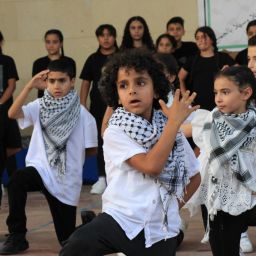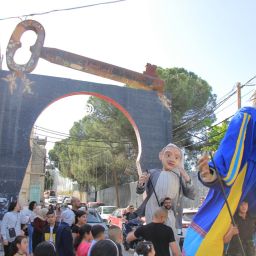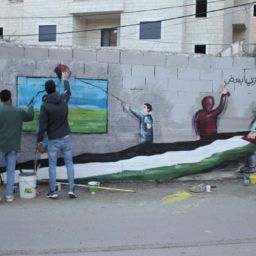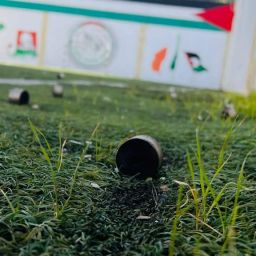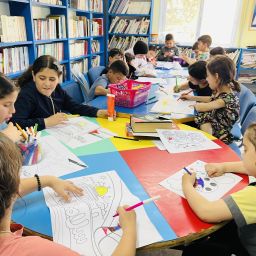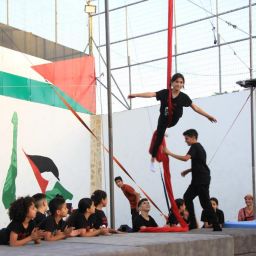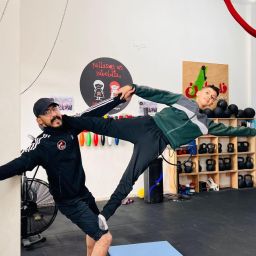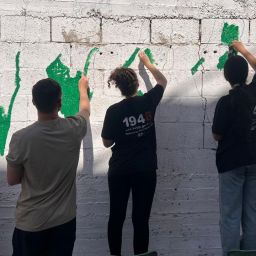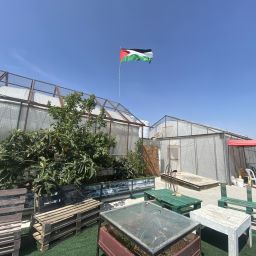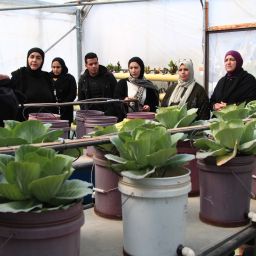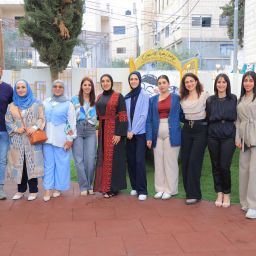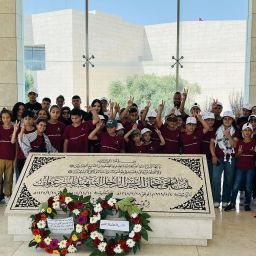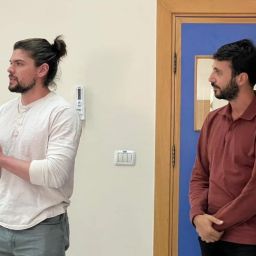Women’s Unit
The Women’s Unit concluded its series of administrative training sessions for the women involved in the cooperative initiative. The final workshop was organized in collaboration with the Media Unit and focused on product photography. Led by Lajee Media Coordinator, Shiraz, the training included a presentation on key photography concepts, followed by a practical session where participants styled and photographed products.
This hands-on experience helped the women understand how to professionally showcase their goods. Six participants took part in the session, which built on previous meetings facilitated by trainer Lian Al-Azza.
Library Unit
In commemoration of the Palestinian Nakba, the Library Unit organized an awareness activity at Zahrat Al-Yasmeen Kindergarten entitled “The Key of Return.” The session aimed to instill a sense of identity and belonging by introducing children to the names and characteristics of depopulated Palestinian villages through simplified visuals. Each child created a symbolic key and wrote the name of their family’s village inside it.
Regular weekly activities also continued throughout May. These included ongoing storytelling programs with kindergarten students, introducing new books that support seasonal themes and literacy development. One of the highlights was the implementation of “My Letters Story” with the children. This activity used engaging storytelling methods to introduce children to the Arabic alphabet in a fun and memorable way. Through the use of storybooks, colorful letter cards, interactive worksheets, and games, children were able to connect letters with words while participating in collaborative learning experiences.
Additionally, Friday sessions for children remained a staple in the library’s calendar, offering creative reading, drawing, and coloring activities in a warm and engaging environment.
Music Unit
The Music Unit remained active throughout May, offering both practical and theoretical musical education. A total of 23 students continued their hands-on training across a variety of instruments. Among them, students learning the oud and qanun underwent an evaluative exam to assess their progress and prepare them for the next level of instruction.
Alongside the practical lessons, the unit conducted theoretical music classes tailored to three distinct groups based on age and experience. These classes culminated in final exams that marked the end of the academic term. Additionally, the children’s choir rehearsed regularly, with participants continuing to refine their vocal skills and prepare for future performances.
Zahrat Al-Yasmeen Kindergarten
Zahrat Al-Yasmeen Kindergarten proudly marked a significant milestone this May with the graduation of its fourth group of young learners. The celebration was a vibrant and emotional gathering, attended by proud families, dedicated teachers, and staff from the Lajee Center.
The ceremony featured a lively and diverse artistic program led by the children themselves. They performed traditional Palestinian dances, including dabka, sang songs that reflected their cultural identity, and delivered an environmentally themed presentation, highlighting their growing awareness of social and ecological issues from an early age.
A particularly moving moment of the event came when the children expressed solidarity with their peers in Gaza. Holding photographs of children affected by the war, they called for the right to live in peace, dignity, and safety. Their voices reminded the audience that even at such a young age, children can carry powerful messages of hope and justice.
This graduation was not only a celebration of academic and developmental achievements but also a testament to the values that Zahrat Al-Yasmeen instills in its students — pride in identity, compassion for others, and a sense of responsibility toward their community and the world around them.
Environmental Unit
The environmental team began the month by planting several types of seeds — including lettuce, chard, parsley, and mustard greens — using specialized trays for seedling preparation. They harvested a selection of crops such as chard, lettuce, mustard, tomatoes, and cucumbers, which were distributed to patients in the community as part of a health-focused outreach effort.
The team also carried out essential maintenance on the rooftop greenhouse at Abu Shaeira’s house, including replacing the water, applying fertilizers and nutrients, and spraying the structure to ensure a healthy growing environment. Another key initiative was the cultivation of beans using the hydroponic pipe system on the center’s rooftop, continuing the center’s commitment to sustainable urban agriculture.
The team also launched its environmental education program this month, which included two themed sessions under the title “Stories from the Past and Present.” These sessions were attended by a group of six patients and five students from the Environmental Club. The program featured a lecture and presentation on different types of seeds and how to germinate them.
Additionally, three interactive workshops were held with the student Environmental Club. These included a creative reuse project where students decorated glass bottles with burlap string, a presentation about the various hydroponic systems in place on the center’s rooftop, and a hands-on activity in which students built a simplified version of the deep-water hydroponic system.
Finally, the Environmental Unit partnered with the Student Parliament at Aida Boys School to clean and prepare a new planting area. Together, they planted a wide variety of crops including fava beans, mustard greens, sweet peppers, radishes, lettuce, parsley, spinach, basil, and peas — turning the schoolyard into a living classroom for ecological awareness and food sovereignty.
Health Unit
In May, the Health Unit organized its 11th Medical Day, a major initiative aimed at providing free, high-quality healthcare to residents of Aida and Al-Azza refugee camps and neighboring areas in Bethlehem. The event featured the participation of five specialized doctors in the fields of orthopedics, pediatrics, ophthalmology, urology, and ENT (ear, nose, and throat), offering a wide range of medical consultations.
The medical day drew a significant turnout, with around 200 individuals from various age groups receiving services. In addition to clinical consultations, the event featured collaborative health awareness stations organized by occupational therapy and nursing students from Bethlehem University. These stations provided visitors with valuable information on topics such as proper posture, blood pressure and glucose screenings, and general health and self-care education.
Free medication was distributed to patients based on prescriptions provided by the attending physicians. This medical day comes at a critical time, as communities across the West Bank continue to face severe economic and healthcare challenges. The initiative not only offered essential medical support but also reinforced the resilience and well-being of the local population through accessible and compassionate healthcare services within the heart of the camp.
Media & Arts Unit
In May, students from the Media Club participated in a practical field session through the streets and alleys of Aida Camp. Building on the theoretical sessions held in previous weeks, this activity focused on improving the students’ skills in camera handling, lighting, and visual composition. The participants explored the camp’s daily life, capturing images that reflect its spirit, resilience, and human stories:
In commemoration of the 77th anniversary of the Nakba, Media Club students also presented visual interventions and short talks about their families’ ancestral villages—many of which are located in the Jerusalem, Hebron, and Ramla areas. Through documented presentations that combined historical facts, personal narratives, and archival materials, students honored the memory of their origins and emphasized the ongoing right of return. This initiative not only preserved collective memory but also empowered youth to become narrators of their own history:
In conjunction with the Nakba events, the Media and Arts Unit launched an innovative campaign titled “Our Villages Will Not Be Forgotten.” The interactive documentation initiative focused on reviving the memory of 27 depopulated Palestinian villages to which residents of Aida and Al-Azza camps trace their roots. As part of the campaign, QR-coded posters were installed on walls throughout both camps. When scanned, each code directs users to a dedicated digital file containing historical information, archival photos, and videos that tell the story of each village and its displacement in 1948.
Lajee Celtic Club & Academy
The Academy’s Juniors Team played a friendly match at Beit Sahour stadium, securing a win with a score of 4–3. Meanwhile, the Youth Team also completed eight training sessions and participated in a spirited match at Doha’s futsal field against the Creativity and Excellence Academy (Dheisheh), ending in a thrilling 7–7 draw.
Competitive matches featured prominently in the month’s agenda. On May 4th, the team played an away match against Shabab Al-Eizariya, narrowly losing 4–3. On May 15th, Lajee Celtic emerged victorious with a reverse score of 4–3. On May 30th, the team hosted Shabab Kharras Club at the Al-Khader International Stadium and delivered an impressive performance, winning 5–2.
Additionally, Lajee Celtic took part in the National Youth Council Conference in Bethlehem, sponsored by the Higher Council for Youth and Sports. The club also featured in a special media appearance on Basmat Shabab, a youth-focused TV program, where representatives discussed the team’s athletic, national, and political role in fostering international solidarity and strengthening ties between Palestinian identity and sport.
ACLAI Palestine Gym
Coaches received practical training on designing personalized fitness programs, with an emphasis on adapting routines based on age and physical condition. Female coaches continued working on program-building through guided examples and weekly team meetings.
Participation increased notably this month, with 135 active women and girls, including 40 new members, and the formation of two new male groups — one for adult men and one for boys. The total number of male participants reached 60, and the male patients’ group was officially transitioned to coach Mohammad Abu Hammad.
Rebel Circus School
Circus students across all levels continued their regular training, with Group 2 participating in intensive sessions five days a week. Group 4 also continued their Spanish language classes twice a week, building both their language and cultural skills in preparation for their upcoming trip to Spain.
One of the month’s major highlights was the progress made by all students in completing Stage 1 of the circus program. Under the guidance of trainer Sue, students successfully mastered the required movements and routines. Sue’s dedication and commitment were acknowledged with heartfelt messages of appreciation from the students, a testament to the strong bond and respect she has built with them.
A special meeting was held for students chosen to travel to Spain, providing them with the opportunity to prepare and discuss the experience ahead. At the same time, students continued their weekly visits to the kindergarten, gaining valuable performance experience and engaging with the community.
In addition to training and outreach, a cultural field trip was organized to Battir village. Students enjoyed a group dinner and participated in reflective conversations about their experiences, further strengthening team bonds and cultural awareness.


